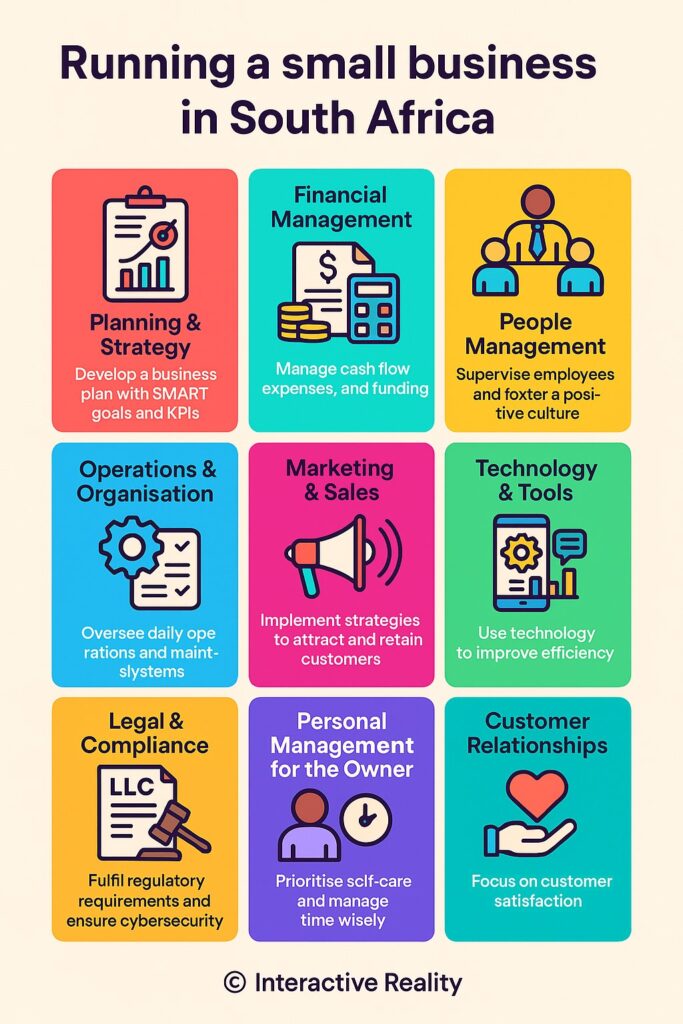Running a small business means managing every part of the operation — from marketing and sales to customer service, product development, finance, and IT. It covers everything needed to keep the business running smoothly. Running a small business demands a wide range of skills, a lot of time and effort, and a commitment to ongoing learning and adaptation. Managing all these responsibilities well is essential for success.
Small business management involves several key areas:
Planning & strategy

Developing a detailed business plan is essential. It should outline your goals, target market, and competitive environment. Setting SMART goals (specific, measurable, achievable, relevant, and time-based) and tracking them through key performance indicators (KPIs) is crucial. Business owners also need to plan strategies and operations with both short-term and long-term objectives in mind, looking ahead five to ten years. The owner typically takes responsibility for overseeing the bigger picture.
Financial management

Good financial management is critical. This includes handling cash flow, budgeting, expenses, and accounting. Important practices are keeping business and personal finances separate, monitoring financial records regularly, paying yourself a salary, managing costs and ROI, maintaining good billing practices to protect cash flow, spreading tax payments over time, maintaining strong business credit, and managing debt wisely. It’s also important to control unnecessary spending and secure funding when needed, such as through business loans.
People Management
Hiring, training, and managing employees is a major responsibility. It means leading and motivating your team, helping them grow, hiring based on attitude and training for skill, being transparent, providing regular feedback, and nurturing a positive company culture. Defining clear roles, setting policies and procedures, and managing payroll are also vital parts of people management.
Operations and Organisation
Managing daily operations, organising resources, and creating efficient, repeatable processes are key to keeping the business on track. This includes detailed work like handling finances, purchasing, tracking key metrics, and managing administrative tasks.
Marketing and Sales
Developing and leading strong marketing and sales strategies are necessary for growth. This involves building a strong brand, understanding your target audience, attracting new customers, and maintaining good relationships with existing ones. In some cases, focusing on high-value customers can be an effective strategy.
Technology and Tools
Using technology and digital tools can make a big difference. They can streamline tasks in areas like communication, accounting, customer relationship management (CRM), inventory, and project management. Automating repetitive tasks when possible saves time. Keeping up with new technologies and market trends is also crucial for staying competitive in the long run.
Legal and Compliance
Setting up an official business structure, such as a limited liability company (LLC), helps protect personal assets. Business owners must also understand and comply with legal regulations and put strong cybersecurity measures in place.
Personal Management for the Owner
Since small business owners often juggle many roles, time and task management skills are essential. Prioritising work, delegating when possible, scheduling time to focus on strategy, and sticking to a daily to-do list can help. Continuous learning is important to keep growing. Owners also need to take care of their personal well-being by exercising, sleeping enough, eating healthily, staying social, pursuing hobbies, and managing daily stress to avoid burnout.
Customer Relationships
Building strong relationships with customers is a major part of running a business. Keeping customers happy leads to repeat business and referrals.

